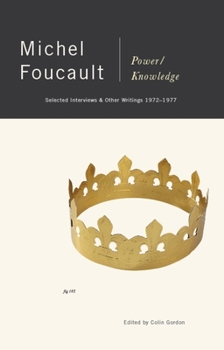Power/Knowledge: Selected Interviews and Other Writings, 1972-1977
Select Format
Select Condition 
Book Overview
Customer Reviews
Rated 5 starsExcellent Primer
Excellent preliminary introduction to the thought of French philosopher Michel Foucault, who was situated at the forefront of French post-modernity and post-structuralism during the 1960's, grouped with other intellectuals such as Derrida, Lacan, Althusser, and Delueze. For Foucault, (as it exists in modern societies) power is not an entity to be acquired, it is an instrument that is continually exercised. Power operates...
0Report
Rated 5 starsFoucault 101 - don't stop your education here.
Power/Knowledge is an excellent introduction to and distillation of the thought of Michel Foucault. It's much more functional than The Foucault Reader, which offers a few key essays ("What Is Enlightenment?", "Nietzsche, Genealogy, and History", etc.) mixed with book excerpts, and may be more gentle to the first-time reader than diving into one of Foucault's full-length works. This book offers the colloquial Foucault, as...
0Report
Rated 5 starsIlluminating Interviews
The collection of interviews contained in this volume is a great guide to anyone interested in examining the work of Michel Foucault, whose work broke new ground through his sustained examination of the interplay between the forces of pwer and the production of knowledges. For those who have previously read works such as The History of Sexuality or Discipline and Punish, this volume is sure to have many jewels that both clarifies...
0Report
Rated 5 starsLooking into the web of power
The relationship between knowledge, truth and power are critical elements in cross-cultural sociological study. Foucault details the relationship between these elements. The relationship between these elements relates directly to global media. If media is predominately produced in one geographic region and exported to another, power in terms of the right to representation, is automatically usurped by the production of truth,...
0Report
Rated 5 starsTough Read, Worth the Trouble
Some serious food for thought here. Not only is the power to define madness, criminality, and sexuality addressed, but also the active use of criminals, and sex, to suppress and subjugate the populace. Somewhat more difficult to wade through but similar to Norman Cousins, it helped provoke my thinking on how top-down unilateral command based on secrets is inevitably going to give way to bottom-up multicultural decision-making...
0Report












